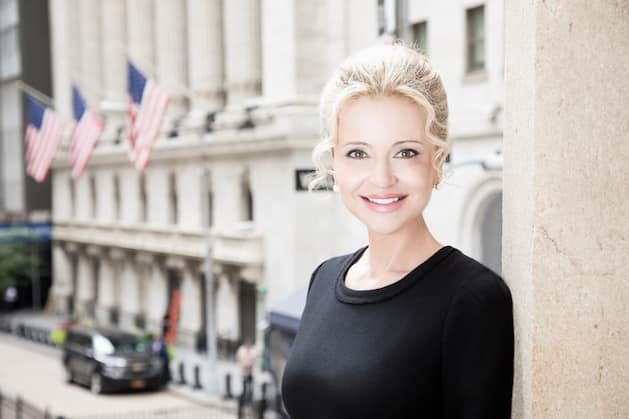Economic expert Sandra Navidi on US economic policy and its impact on Europe, on the crash of cryptocurrencies, on the cult of masculinity and feminist investment policy.
Ms. Navidi, you were in Davos and are in Germany at the moment. We are worried about a massive economic crisis here. How justified is this fear?
Sandra Navidi: In times of absolute uncertainty and extreme developments such as boom cycles, financial crises, natural disasters or geopolitical conflicts, we tend to be overly pessimistic or optimistic. Add to that the herd instinct and the media, which solidify narratives at breakneck speed. And sometimes the dissemination of such narratives also serves selfish interests. It is true that the German economy is facing serious challenges. However, many companies have shown agility, restructuring their supply chains and relocating production sites. A bit of luck is part of it, like the mild winter, at least until January, and the weakened demand for energy from China. That eased the situation. Of course – the world is changing and the German export industry is facing major challenges. But companies have shown resilience so far, and I’m confident they will continue to do well if governments put the right framework in place.
Europe’s economy is closely intertwined with that of the US, where you live. Indicators such as unemployment have already improved there. What does this mean for interest rate developments this year?
Navidi: In my opinion, falling interest rates are not to be expected this year. However, I don’t think the Fed will overshoot interest rates either. It will act cautiously given the economic slowdown and the time lag between rate hikes and their impact.
Sandra Navidi is Chief Executive Officer of the New York-based management consulting firm BeyondGlobal. Navidi is admitted to the bar in Germany and the USA, is considered one of the best-connected people in global high finance and is known from international media as an economic expert. Her third book, The DNA of the USA: What Makes America tick?, was published in October 2022.
Which then goes down well on the stock exchanges.
Navidi: Yes – and it would also have a positive impact on the credibility of the central bank. She suffered from her late action.
The European Central Bank has waited even longer. Is the impression that the USA is often ahead of us misleading? How do you experience your adopted country?
Navidi: I just wrote a book about The DNA of the USA. That’s exactly what I’m explaining. I’m trying to portray the collective American character without prejudice. Americans are enormously dynamic and creative. Politics is taking hold. But I also shed light on why Americans’ greatest strengths are also their greatest weaknesses, which have led to an acute crisis in their democracy. Using American history, culture, and worldview, I analyze why many Americans are so vulnerable to disinformation, propaganda, and extremism. It’s about the background and unbelievable excesses of the culture war and the formation of religious fundamentalism, right-wing extremist forces, the toxic culture of masculinity and a gun cult in which mini AR-15 rapid-fire guns are already being sold to children. And of course the impact of this culture on the economy and the transatlantic relationship.
You are harshly criticizing the United States.
Navidi: The fate of my adopted country is very important to me, but I experienced the negative developments directly on site.
What does this US policy mean for Germany and Europe?
Navidi: There is a lot at stake for Europe. Biden’s foreign trade policy is moderately protectionist. He’s under political pressure. When the economy weakens and unemployment rises, the odds for a “Trumpist” candidate increase. Since the economy has been doing well so far despite the restrictive central bank policy, Biden has room to accommodate Europe. Foreclosure, market fragmentation and a subsidy race would harm both Europe and the United States.
So little reason for optimism?
Navidi: Yes, America’s economy is overall robust. And Biden’s “Inflation Reduction Act” is once again bringing out very sharp artillery to make the country future-proof. Added to this are the “Infrastructure Act” and the “Chips and Science Act”, which will lead to billions being invested in domestic semiconductor production over the next few years. There is the “Foreign Direct Production Rule”, according to which, among other things, no American high-performance chips and related know-how may be exported, and the “National Critical Capabilities Defense Act”, which is intended to secure strategically important supply chains and products. All of these are business development programs, of course. Generally speaking, America is still the IT center of the world. Another competitive advantage is the agility and flexibility of American society. Because the social system is less developed, people are more willing to take risks and have to make ends meet. This creates a dynamic that is noticeably weaker in Europe.
OK. And the biggest risk of this US policy – what is it?
Navidi: The biggest current risk is an escalation of the debt limit negotiations. This is authorization to pay off debts already incurred. The Republicans regularly try to blackmail the Democrats with a potential “state bankruptcy”. So far, the curve has always been caught at the last minute, because a US default would unhinge the global financial system. The Democrats still have some time. But the negotiations are complex, and because there are many other aspects involved, the final word has not yet been spoken.
And I thought the biggest risk was the war in Ukraine?
Navidi: The Ukraine war is extremely inopportune for Biden. Yes, some industries, such as energy and defense companies, are benefiting from the conflict. But the war is also one of the reasons for the increased inflation, and Biden has to sell the billions in aid for Ukraine to the population. This is becoming increasingly difficult politically, above all because many Republicans are taking countermeasures. They ask: What do we have to do with the Ukraine war? Russia is not our enemy. It would be better to invest these billions for our own people than to squander them abroad, for a country with which we have nothing to do. This reasoning resonates with many voters.
Have investors gotten used to the war in Europe? Is it priced in, so to speak?
Navidi: Historically, market participants have been bad at assessing geopolitical crises. A certain habituation effect occurs. And the market has eased somewhat because the worst expectations have not materialized. For example, energy prices have risen less than feared due to the mild winter so far and subdued demand from China.
China switched quite abruptly from a zero-Covid to a Covid-we-don’t-care policy. Both are criticized in this country. What are the medium-term consequences of this Chinese policy for the economy and the stock market?
Navidi: The centralization, the concentration of power and the arbitrariness of Chinese politics are further fueling the already existing volatility. The biggest risk to the Chinese economy is the lack of effective vaccines. An opening for western mRNA vaccines is not yet in sight. It is currently still uncertain whether the Chinese mRNA vaccine production will be successful in the near future. So it remains to be seen how the infection situation will develop after the “superspreader event” of the Chinese New Year. The worst-case scenario would be the emergence of vaccine-resistant variants.
Does the pandemic still play a role on the stock exchanges at all?
Navidi: Basically not. The pandemic is having an impact on the economy, but it has fared well on the back of government aid and through supply chain restructuring, increasing automation and further innovation.
Which asset classes are you keeping an eye on in 2023 when you look at global investment opportunities?
Navidi: The renewable energy sector remains attractive and will particularly benefit from the “Inflation Reduction Law”. But there should also be good opportunities in the healthcare sector as a result of the convergence of biotechnology, artificial intelligence and supercomputing power. Despite recent poor performance, the outlook for the technology sector remains solid overall over the medium to long term. These companies are ideally placed to continuously innovate. Because of their financial strength, they can absorb emerging competitors. Some of the most promising areas include cloud computing, semiconductor manufacturing, and cybersecurity. Automation and electromobility also remain interesting.
And what about the crypto world? Crypto assets, i.e. digital securities, are an exciting topic for the future, but the public is currently still more interested in speculative cryptocurrencies such as Bitcoin
Navidi: The gold rush mood has been followed by disillusionment. Cryptocurrencies are still looking for a use. Cases of fraud are the rule rather than the exception in this sector. Of course, not every crypto venture is fraudulent, but fraud seems to be the only practical use case. Because cryptocurrencies are not suitable as a means of payment due to their volatility, consumer protection does not exist, abuse for illegal activities such as tax evasion and via the Darknet for ransomware, i.e. digital blackmail, flourishes. Quite apart from the energy efficiency and the environmental protection problem. If you have play money left and are too lazy to go to the casino, you can buy cryptocurrencies from the sofa. However, only if he can get over the loss of the invested capital. Normal private investors are advised not to use cryptocurrencies.
What role does gold play?
Navidi: Gold has always been seen as a classic inflation hedge, although historically the price of gold and inflation have not necessarily been correlated. Gold isn’t just an investment, it’s a worldview. It has no intrinsic value and little practical use. Its value is essentially determined by supply and demand, and that depends on investor sentiment. Traditionally, however, gold has proven itself as a store of value due to its cultural anchoring. It is a safeguard because it has retained its value and even increased in some cases even in catastrophic scenarios. Uncertainty about potential trade wars, weaker global economic growth and high government debt worldwide are fueling investors’ search for a safe haven. Basically, investing in gold requires a long-term horizon, patience and strong nerves.
One final question for you as an investor: we are currently hearing a lot about “feminist” politics. What do you think: is there a specific feminist investment policy?
Navidi: If you coin a brand slogan that is not obviously understandable, that is sub-ideal. In view of the current culture war over values and morals, such a term tends to polarize and is therefore ultimately counterproductive. Sometimes it’s better to do things without labeling them – and that includes promoting women in economic policy. When it comes to investment decisions by women, there are indeed special features to consider. But I’m not sure if the term “feminist” captures the essence. This article first appeared on deka.de















